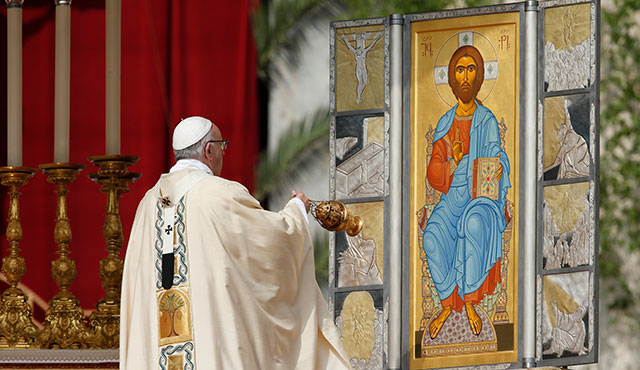After 40 long days, Lent concludes with the Easter vigil on Holy Saturday. But the Easter celebration in the Catholic Church stretches until Pentecost – long after the egg hunts and chocolate bunnies.
The Easter Season, or Eastertide, is the period of 50 days from Easter Sunday to Pentecost Sunday. It is celebrated as a single joyful feast. Each Sunday of the season is treated as a Sunday of Easter, and, after the Sunday of the Resurrection, they are named Second Sunday of Easter, Third Sunday of Easter, up to the Seventh Sunday of Easter, while the whole period concludes with Pentecost Sunday.
The United States Conference of Catholic Bishops notes that the Easter Vigil is the “Mother of All Vigils,” and Easter Sunday is the greatest of all Sundays. The Bishops note, then, that Easter Time is the most important of all liturgical times. In Roman Catholic churches, the “Alleluia” is sung for the first time since the beginning of Lent.
Easter is the celebration of the Lord’s resurrection from the dead, culminating in his Ascension to the Father and sending of the Holy Spirit upon the Church. It is characterized, above all, by the joy of glorified life and the victory over death, expressed most fully in the great resounding cry of the Christian: Alleluia! All faith flows from faith in the resurrection: “If Christ has not been raised, then empty is our preaching; empty, too, is your faith.” (1 Cor 15:14)
Secular family celebrations on Easter Sunday for Americans involve children hunting for Easter eggs, which include brightly dyed hard-boiled eggs or plastic eggs filled with candy or small amounts of money. Candy is a traditional gift for Easter, as children (and adults) often break their Lenten fasts with sweets. Families gather for a big meal and share bouquets of flowers and greeting cards.
Because of the central importance of Easter to the Christian faith, the Catholic Church requires that all Catholics who have made their First Communion receive the Holy Eucharist sometime during the Easter season. The Church also urges us to take part in the Sacrament of Confession before receiving this Easter Communion. Reception of the Eucharist is a visible sign of our faith and our participation in the Kingdom of God. Our Easter Duty is the minimum requirement of the Church.
“As we know from the Gospels, Jesus Christ rose from the dead on the third day following his crucifixion, which would be Sunday,” writes Catholic Online. “His resurrection marks the triumph of good over evil, sin and death. It is the singular event that proves that those who trust in God and accept Christ will be raised from the dead.
“Since Easter represents the fulfillment of God’s promises to mankind,” they continue, “it is the most important holiday on the Christian calendar.”
Based on direct evidence from the mid-second century, the site says, it is believed that Easter was regularly celebrated from the earliest days of the Church.
The Easter date is movable and always falls on a Sunday between March 22 and April 25. Easter in the Roman Catholic Church is always on the first Sunday after the first full moon after the spring equinox.
People who are converting to Catholicism traditionally are baptized at the Easter Vigil service, which takes place on Holy Saturday, starting sometime after sunset. They have undergone a long process of study and preparation known as the Rite of Christian Initiation for Adults (RCIA). Their baptism parallels Christ’s own death and resurrection, as they die to sin and rise to new life in the Kingdom of God.

